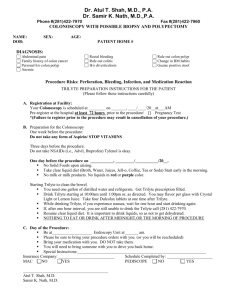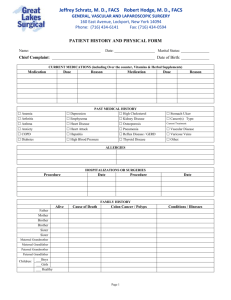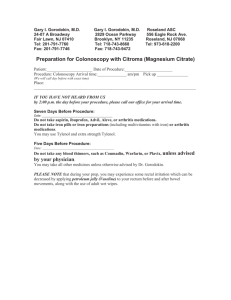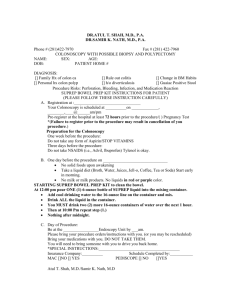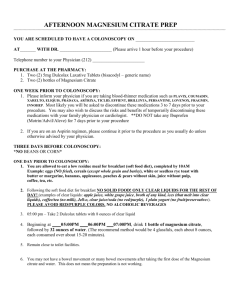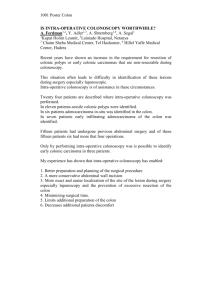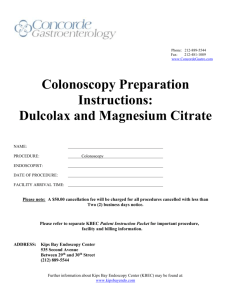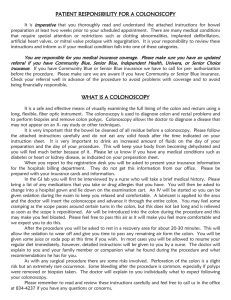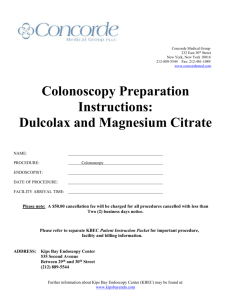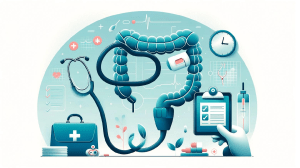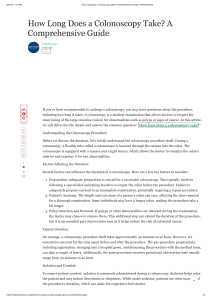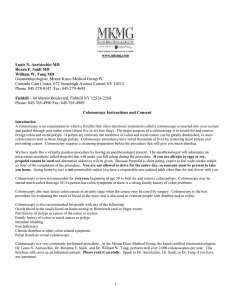Magnesium-Citrate-Colonoscopy
advertisement
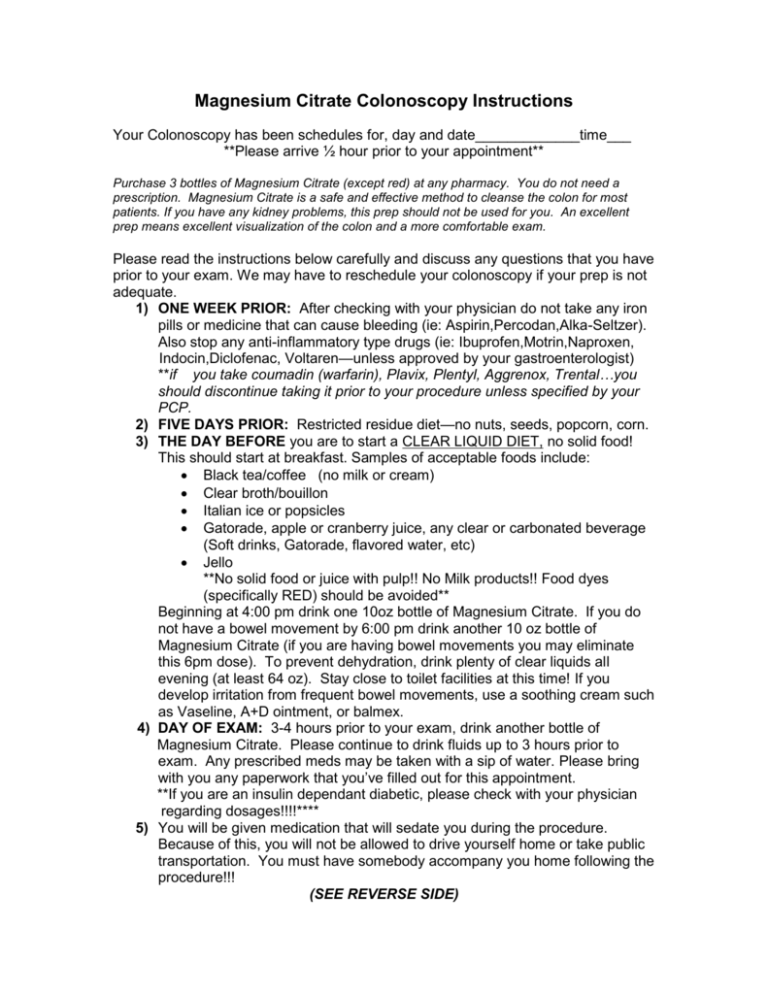
Magnesium Citrate Colonoscopy Instructions Your Colonoscopy has been schedules for, day and date_____________time___ **Please arrive ½ hour prior to your appointment** Purchase 3 bottles of Magnesium Citrate (except red) at any pharmacy. You do not need a prescription. Magnesium Citrate is a safe and effective method to cleanse the colon for most patients. If you have any kidney problems, this prep should not be used for you. An excellent prep means excellent visualization of the colon and a more comfortable exam. Please read the instructions below carefully and discuss any questions that you have prior to your exam. We may have to reschedule your colonoscopy if your prep is not adequate. 1) ONE WEEK PRIOR: After checking with your physician do not take any iron pills or medicine that can cause bleeding (ie: Aspirin,Percodan,Alka-Seltzer). Also stop any anti-inflammatory type drugs (ie: Ibuprofen,Motrin,Naproxen, Indocin,Diclofenac, Voltaren—unless approved by your gastroenterologist) **if you take coumadin (warfarin), Plavix, Plentyl, Aggrenox, Trental…you should discontinue taking it prior to your procedure unless specified by your PCP. 2) FIVE DAYS PRIOR: Restricted residue diet—no nuts, seeds, popcorn, corn. 3) THE DAY BEFORE you are to start a CLEAR LIQUID DIET, no solid food! This should start at breakfast. Samples of acceptable foods include: Black tea/coffee (no milk or cream) Clear broth/bouillon Italian ice or popsicles Gatorade, apple or cranberry juice, any clear or carbonated beverage (Soft drinks, Gatorade, flavored water, etc) Jello **No solid food or juice with pulp!! No Milk products!! Food dyes (specifically RED) should be avoided** Beginning at 4:00 pm drink one 10oz bottle of Magnesium Citrate. If you do not have a bowel movement by 6:00 pm drink another 10 oz bottle of Magnesium Citrate (if you are having bowel movements you may eliminate this 6pm dose). To prevent dehydration, drink plenty of clear liquids all evening (at least 64 oz). Stay close to toilet facilities at this time! If you develop irritation from frequent bowel movements, use a soothing cream such as Vaseline, A+D ointment, or balmex. 4) DAY OF EXAM: 3-4 hours prior to your exam, drink another bottle of Magnesium Citrate. Please continue to drink fluids up to 3 hours prior to exam. Any prescribed meds may be taken with a sip of water. Please bring with you any paperwork that you’ve filled out for this appointment. **If you are an insulin dependant diabetic, please check with your physician regarding dosages!!!!**** 5) You will be given medication that will sedate you during the procedure. Because of this, you will not be allowed to drive yourself home or take public transportation. You must have somebody accompany you home following the procedure!!! (SEE REVERSE SIDE) Colonoscopy Frequently Asked Questions and Answers Q: What is a Colonoscopy? A: A colonoscopy is an examination of the colon using a flexible scope. This technique has the ability to diagnose most of the common diseases of the colon and removal of small growths or polyps. A colonoscopy is well-tolerated and rarely causes much pain. Air is used to inflate your colon so that the physician can visualize the inner walls, you sense this as a gas cramp and this is why sedation is used. Q: What type of Sedation is used? A: A Moderate (Conscious) Sedation is used. Moderate sedation is the use of medications to depress the level of consciousness in a patient while allowing the patient to breathe independently and respond appropriately to verbal commands and/or gently stimulation. Most patients sleep through the exam and wake just as the exam is finishing. Q: What are Polyps? A: Polyps are abnormal growths in the colon lining that are usually benign. They vary in size from a tiny dot (the size of a freckle) to several inches. There are 2 main types of polyps: adenomas (precancerous) and hyperplastic (benign, non-cancerous). Your doctor can’t always differentiate between the 2, benign vs precancerous, by its outer appearance, so he/she sends the removed polyps to a pathologist for analysis. Because cancer begins as a polyp, removing them is an important means of preventing colon cancer. Q: What happens after a Colonoscopy? A: The physician will speak with you after the exam and review preliminary results. Biopsies may take up to one week to result from pathology. Sedation will be used during the procedure so someone must drive you home and stay with you. Even if you feel alert after the procedure, your judgment and reflexes will be impaired for the rest of the day. You might have some cramping or bloating because of the air introduced into the colon during the exam. This should disappear quickly when you pass gas. You should be able to resume a normal diet after the exam!!!
